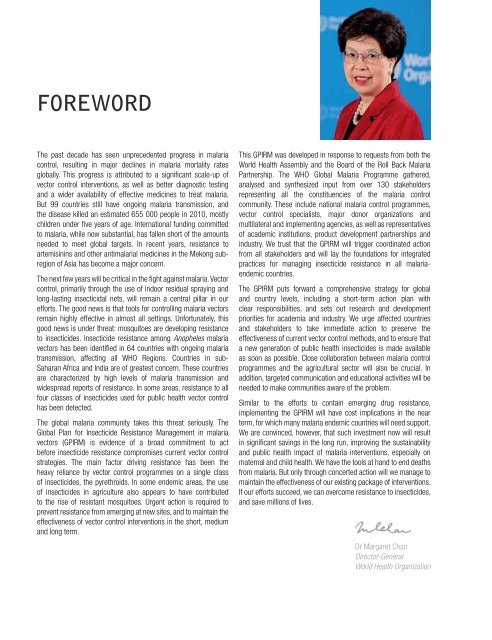Global plan for insecticide resistance management in malaria vectors
Global plan for insecticide resistance management in malaria vectors
Global plan for insecticide resistance management in malaria vectors
- No tags were found...
Create successful ePaper yourself
Turn your PDF publications into a flip-book with our unique Google optimized e-Paper software.
ForewordThe past decade has seen unprecedented progress <strong>in</strong> <strong>malaria</strong>control, result<strong>in</strong>g <strong>in</strong> major decl<strong>in</strong>es <strong>in</strong> <strong>malaria</strong> mortality ratesglobally. This progress is attributed to a significant scale-up ofvector control <strong>in</strong>terventions, as well as better diagnostic test<strong>in</strong>gand a wider availability of effective medic<strong>in</strong>es to treat <strong>malaria</strong>.But 99 countries still have ongo<strong>in</strong>g <strong>malaria</strong> transmission, andthe disease killed an estimated 655 000 people <strong>in</strong> 2010, mostlychildren under five years of age. International fund<strong>in</strong>g committedto <strong>malaria</strong>, while now substantial, has fallen short of the amountsneeded to meet global targets. In recent years, <strong>resistance</strong> toartemis<strong>in</strong><strong>in</strong>s and other anti<strong>malaria</strong>l medic<strong>in</strong>es <strong>in</strong> the Mekong subregionof Asia has become a major concern.The next few years will be critical <strong>in</strong> the fight aga<strong>in</strong>st <strong>malaria</strong>. Vectorcontrol, primarily through the use of <strong>in</strong>door residual spray<strong>in</strong>g andlong-last<strong>in</strong>g <strong>in</strong>secticidal nets, will rema<strong>in</strong> a central pillar <strong>in</strong> ouref<strong>for</strong>ts. The good news is that tools <strong>for</strong> controll<strong>in</strong>g <strong>malaria</strong> <strong>vectors</strong>rema<strong>in</strong> highly effective <strong>in</strong> almost all sett<strong>in</strong>gs. Un<strong>for</strong>tunately, thisgood news is under threat: mosquitoes are develop<strong>in</strong>g <strong>resistance</strong>to <strong><strong>in</strong>secticide</strong>s. Insecticide <strong>resistance</strong> among Anopheles <strong>malaria</strong><strong>vectors</strong> has been identified <strong>in</strong> 64 countries with ongo<strong>in</strong>g <strong>malaria</strong>transmission, affect<strong>in</strong>g all WHO Regions. Countries <strong>in</strong> sub-Saharan Africa and India are of greatest concern. These countriesare characterized by high levels of <strong>malaria</strong> transmission andwidespread reports of <strong>resistance</strong>. In some areas, <strong>resistance</strong> to allfour classes of <strong><strong>in</strong>secticide</strong>s used <strong>for</strong> public health vector controlhas been detected.The global <strong>malaria</strong> community takes this threat seriously. The<strong>Global</strong> Plan <strong>for</strong> Insecticide Resistance Management <strong>in</strong> <strong>malaria</strong><strong>vectors</strong> (GPIRM) is evidence of a broad commitment to actbe<strong>for</strong>e <strong><strong>in</strong>secticide</strong> <strong>resistance</strong> compromises current vector controlstrategies. The ma<strong>in</strong> factor driv<strong>in</strong>g <strong>resistance</strong> has been theheavy reliance by vector control programmes on a s<strong>in</strong>gle classof <strong><strong>in</strong>secticide</strong>s, the pyrethroids. In some endemic areas, the useof <strong><strong>in</strong>secticide</strong>s <strong>in</strong> agriculture also appears to have contributedto the rise of resistant mosquitoes. Urgent action is required toprevent <strong>resistance</strong> from emerg<strong>in</strong>g at new sites, and to ma<strong>in</strong>ta<strong>in</strong> theeffectiveness of vector control <strong>in</strong>terventions <strong>in</strong> the short, mediumand long term.This GPIRM was developed <strong>in</strong> response to requests from both theWorld Health Assembly and the Board of the Roll Back MalariaPartnership. The WHO <strong>Global</strong> Malaria Programme gathered,analysed and synthesized <strong>in</strong>put from over 130 stakeholdersrepresent<strong>in</strong>g all the constituencies of the <strong>malaria</strong> controlcommunity. These <strong>in</strong>clude national <strong>malaria</strong> control programmes,vector control specialists, major donor organizations andmultilateral and implement<strong>in</strong>g agencies, as well as representativesof academic <strong>in</strong>stitutions, product development partnerships and<strong>in</strong>dustry. We trust that the GPIRM will trigger coord<strong>in</strong>ated actionfrom all stakeholders and will lay the foundations <strong>for</strong> <strong>in</strong>tegratedpractices <strong>for</strong> manag<strong>in</strong>g <strong><strong>in</strong>secticide</strong> <strong>resistance</strong> <strong>in</strong> all <strong>malaria</strong>endemiccountries.The GPIRM puts <strong>for</strong>ward a comprehensive strategy <strong>for</strong> globaland country levels, <strong>in</strong>clud<strong>in</strong>g a short-term action <strong>plan</strong> withclear responsibilities, and sets out research and developmentpriorities <strong>for</strong> academia and <strong>in</strong>dustry. We urge affected countriesand stakeholders to take immediate action to preserve theeffectiveness of current vector control methods, and to ensure thata new generation of public health <strong><strong>in</strong>secticide</strong>s is made availableas soon as possible. Close collaboration between <strong>malaria</strong> controlprogrammes and the agricultural sector will also be crucial. Inaddition, targeted communication and educational activities will beneeded to make communities aware of the problem.Similar to the ef<strong>for</strong>ts to conta<strong>in</strong> emerg<strong>in</strong>g drug <strong>resistance</strong>,implement<strong>in</strong>g the GPIRM will have cost implications <strong>in</strong> the nearterm, <strong>for</strong> which many <strong>malaria</strong> endemic countries will need support.We are conv<strong>in</strong>ced, however, that such <strong>in</strong>vestment now will result<strong>in</strong> significant sav<strong>in</strong>gs <strong>in</strong> the long run, improv<strong>in</strong>g the susta<strong>in</strong>abilityand public health impact of <strong>malaria</strong> <strong>in</strong>terventions, especially onmaternal and child health. We have the tools at hand to end deathsfrom <strong>malaria</strong>. But only through concerted action will we manage toma<strong>in</strong>ta<strong>in</strong> the effectiveness of our exist<strong>in</strong>g package of <strong>in</strong>terventions.If our ef<strong>for</strong>ts succeed, we can overcome <strong>resistance</strong> to <strong><strong>in</strong>secticide</strong>s,and save millions of lives.Dr Margaret ChanDirector-GeneralWorld Health Organization
















